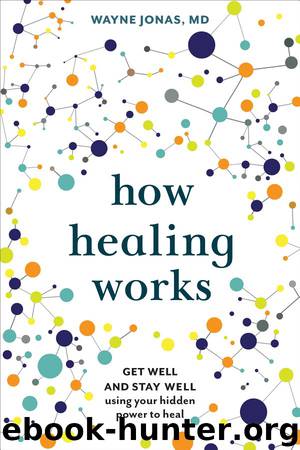How Healing Works by Wayne Jonas

Author:Wayne Jonas
Language: eng
Format: epub
Publisher: Lorena Jones Books
Published: 2018-01-09T00:00:00+00:00
DR. GELLER
Dr. Jeffery Geller is one of the world’s experts on healing chronic illness through social connection. He does this through group visits conducted at a community health center in Lawrence, Massachusetts—the poorest county in that state. Some of his groups gather for specific illnesses—like for weight loss, diabetes, cardiovascular disease—or chronic pain, like Gloria had. Some of his groups are to change behavior—like for fitness, cooking, or stress management. Many have no theme other than improving health and well-being in general. But Dr. Geller has a different agenda from all of that.
“What I am really treating,” says Dr. Geller, when only slightly pressed, “is loneliness. More people get better, and faster, when I focus on helping them with that than if I only treat their disease or try to change their behavior.” He went on to tell me how he came to this. “At first I was using group visits so I could treat more patients. The demand at the clinic is high and our reimbursement is low. Paying for individual instruction in wellness and lifestyle was not possible. Many of them need help with the same things—diet, exercise, stress, medication management—so why not do it as a group?”
At first, Dr. Geller explained, setting up disease-focused groups seemed the right approach. But then he realized that, like Gloria, the majority of people with chronic illness didn’t like going to a group where everyone seemed sicker or more depressed than they were. In addition, many were also lonely, and that loneliness was preventing them from healing.
“Even if they were not lonely,” Geller said, “connecting with others was not a bad thing for anyone. It’s like social exercise. Nobody can pay for psychotherapy or gym membership anyway. The patients who come to this clinic are poor, and life has not been filled with opportunity. Many of them don’t even have the five-dollar copay we ask for. So I decided to start a bunch of groups based not on my desires or their medical diagnoses, but on their preferences and friendships. If they join a group they like, they stick with it. If, at the same time, they get guidance from me, our health coaches, or each other to help change to healthier behavior, they get better. And best of all,” Dr. Geller noted, “participants become empowered to be healthier because they are supported by others and others need them. They feel important again.”
And that is exactly what happened. Groups began to form that did not conform to the usual medical categories the health care system was trying to treat—like weight loss, cancer support, pain, or post–heart attack. Instead, groups were formed around friendships. Often these took the form of youth groups, men’s or women’s groups, or groups of mothers and seniors. Some combined these categories because the members just got along with each other. Says Dr. Geller, “patients who found and attended a group they liked not only made friends, but their health improved faster than in disease-based groups. Now many of the groups are run by other patients—with help from our staff.
Download
This site does not store any files on its server. We only index and link to content provided by other sites. Please contact the content providers to delete copyright contents if any and email us, we'll remove relevant links or contents immediately.
The Body: A Guide for Occupants by Bill Bryson(5096)
Audition by Ryu Murakami(4930)
Adulting by Kelly Williams Brown(4574)
Housekeeping by Marilynne Robinson(4447)
1578 Plant Pattern Recognition Receptors by Unknown(4354)
Be in a Treehouse by Pete Nelson(4051)
Zero Waste Home by Bea Johnson(3839)
Seriously... I'm Kidding by Ellen DeGeneres(3633)
Better Homes and Gardens New Cookbook by Better Homes & Gardens(3595)
The Healing Self by Deepak Chopra(3579)
Barkskins by Annie Proulx(3371)
Hedgerow by John Wright(3362)
The Cellar by Natasha Preston(3344)
The Genius of Japanese Carpentry by Azby Brown(3309)
Spark Joy by Marie Kondo(3302)
120 Days of Sodom by Marquis de Sade(3275)
The Life-Changing Magic Of Tidying Up- The Japanese Art Of Decluttering And Organizing (v5.0) by Marie Kondo(3269)
Work Clean by Dan Charnas(3123)
The Book of Numbers by Peter Bentley(2968)
